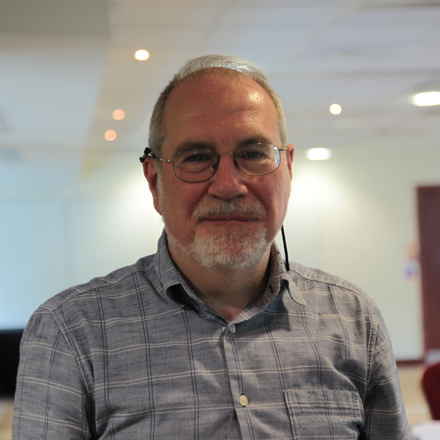‘I was downhearted but Skills for Seeing lifted me’
Posted: Friday 01 July 2022
A volunteer trainer has shared his experience of the Skills for Seeing service, which offers one-to-one advice to help people make the best use of their remaining vision.
Ed Bebbington (pictured left) became a Skills for Seeing trainer after he used the service himself when he was diagnosed with macular disease.
Skills for Seeing combines advice and tips on vision know-how, magnification, lighting and ‘eccentric viewing’ and ‘steady eye strategy’ techniques, all with the aim of allowing people to make best use of their remaining sight, such as enabling them to use peripheral vision to continue watching TV, read or see faces as best as possible.
Ed said: “I was pretty downhearted when I was diagnosed with macular degeneration and I was so encouraged when I went off and did the training to improve my ability see objects and learn eccentric viewing and steady eye strategy techniques.
“That really lifted me and being able to talk to other people with the same problems, and in some cases I was trained by people with worse vision than me, that helped me to see that there were ways to get around problems.
“The other thing we’re trying to do is give people a broader sense of what they can do to adapt along the way in their sight loss journey. I’ve met many people with challenges due to sight loss, yet they’re making so much of their lives. That’s something we can add to the party, for those who want to give Skills for Seeing a go.”
Ed discussed the service on the Working Age and Young People webinar, where he was joined by the Macular Society’s Programmes Manager Hannah Keegan, and Skills for Seeing Programmes Co-ordinator Natalie Bale.
Natalie also talked about helping an 85-year-old maximize their vision, who experienced a "eureka, lightbulb moment" through exploring Skills for Seeing.
The full webinar is available to watch on our YouTube channel.
Skills for Seeing services are run over the phone, online and face-to-face in some cases. There is also an online training platform to help people who want to learn independently, thanks to funding from the Thomas Pocklington Trust.
Learn how to use your remaining vision by taking part in our Eccentric Viewing training. Or, find out more about the telephone or face-to-face training.
